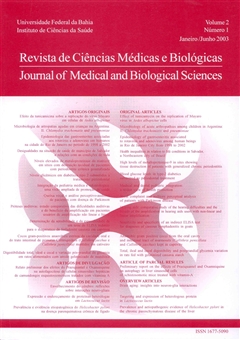Effect of tunicamycin on the replication of Mayaro virus in Aedes albopictus cells
DOI:
https://doi.org/10.9771/cmbio.v2i1.4102Keywords:
Tunicamycin. Mayaro vírus. Aedes albopictus cells.Abstract
Tunicamycin (TM), an inhibiting substance of bacteria, fungi and yeast proliferation, is an antibiotic isolated from Streptomyces lysosuperficus. This antibiotic inhibits the formation of N-acetylglucosamine, thereby it greatly alters the glycosilation of proteins. In this study, we found that the presence of TM causes a drastic inhibition of Mayaro virus replication in Aedes albopictus cells. Even at low concentration (0,05mg/ml), the treatment of the cells for 24 hours reduced in 50% the production of the viral infectious particles. At higher concentrations, the antibiotic reduced progressively the virus replication, resulting in 98,5% inhibition after a 48 hour treatment. The polyacrylamide gel electrophoresis analysis of [35S]-methionine-labelled proteins showed that TM at 0,05mg/ml, 0,1mg/ml e 0,15mg/ml concentration does not affect the synthesis of Mayaro virus polypeptides. Only at higher concentration (0,5mg/ml), the modification of the synthesis and of the electrophoretic mobility of viral proteins were noticed. These results suggest that, at low concentration, TM may affect Mayaro virus replication in Aedes albopictus cells through other mechanisms.Downloads
Download data is not yet available.
Downloads
Published
2003-02-03
How to Cite
Cortez, L. P., Burlandy, F. M., & Rebello, M. A. (2003). Effect of tunicamycin on the replication of Mayaro virus in Aedes albopictus cells. Journal of Medical and Biological Sciences, 2(1), 5–11. https://doi.org/10.9771/cmbio.v2i1.4102
Issue
Section
ORIGINAL ARTICLES
License
The Journal of Medical and Biological Sciences reserves all copyrights of published works, including translations, allowing, however, their subsequent reproduction as transcription, with proper citation of source, through the Creative Commons license. The periodical has free and free access.


